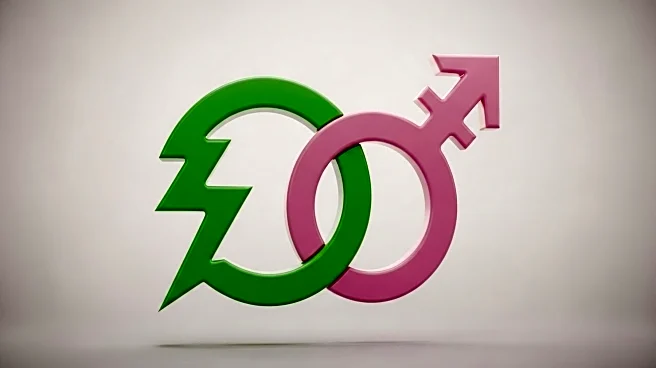What is the story about?
What's Happening?
The International Renewable Energy Agency (IRENA) has released a report indicating that women hold 32% of full-time jobs in the renewable energy sector, a figure that has remained unchanged since the agency's first gender analysis in 2019. The report, titled 'Renewable Energy: A Gender Perspective,' provides a comprehensive assessment of women's participation in the renewable energy workforce and the barriers they face. Despite performing better than in fossil fuel industries, the renewable sector shows little progress in gender equality, particularly in senior leadership positions where women account for only 19%. The report highlights systemic barriers at every stage of professional development, including cultural stereotypes, discriminatory practices, and glass ceilings that hinder women's advancement.
Why It's Important?
The stagnation in gender representation within the renewable energy sector is significant as it impacts the fairness and sustainability of the energy transition. Without greater gender equality, the sector risks labor shortages and a lack of diverse perspectives, which are crucial for innovation and effective decision-making. Women, who are often primary users and managers of household energy systems, play a critical role in advancing energy access, particularly in developing countries. The report calls for targeted policy interventions and active collaboration among stakeholders to address these issues, emphasizing the need for gender equality in climate and energy policies to ensure a comprehensive and inclusive energy transition.
What's Next?
The report suggests several strategies to overcome barriers to gender equality in the renewable energy sector. Governments are encouraged to enforce laws on non-discrimination, equal pay, and access to education, while embedding gender equality into climate and energy policies. Employers should introduce flexible work arrangements, transparent recruitment and promotion practices, mentorship opportunities, and safe workplaces. Educational institutions, trade unions, civil society, and international organizations are urged to dismantle stereotypes, expand opportunities, and hold institutions accountable. These measures aim to recognize women as equal partners and leaders in shaping a renewables-based future.
Beyond the Headlines
The report underscores the ethical and cultural dimensions of gender inequality in the renewable energy sector. It highlights the need for systemic change to dismantle cultural stereotypes and biases that persist in professional environments. The lack of gender balance not only affects the sector's ability to innovate but also reflects broader societal issues regarding gender roles and equality. Addressing these challenges requires a concerted effort across various sectors to promote inclusivity and diversity, ensuring that the energy transition benefits all members of society.

















